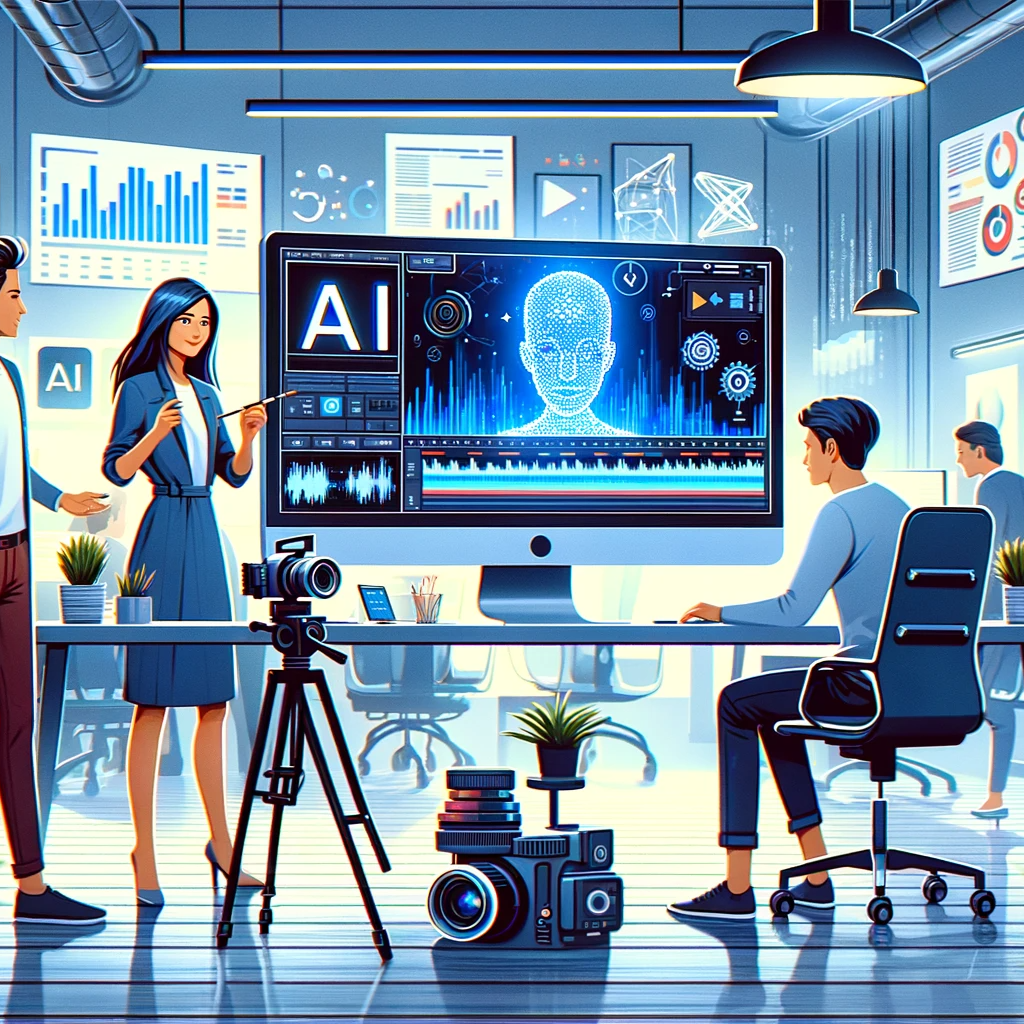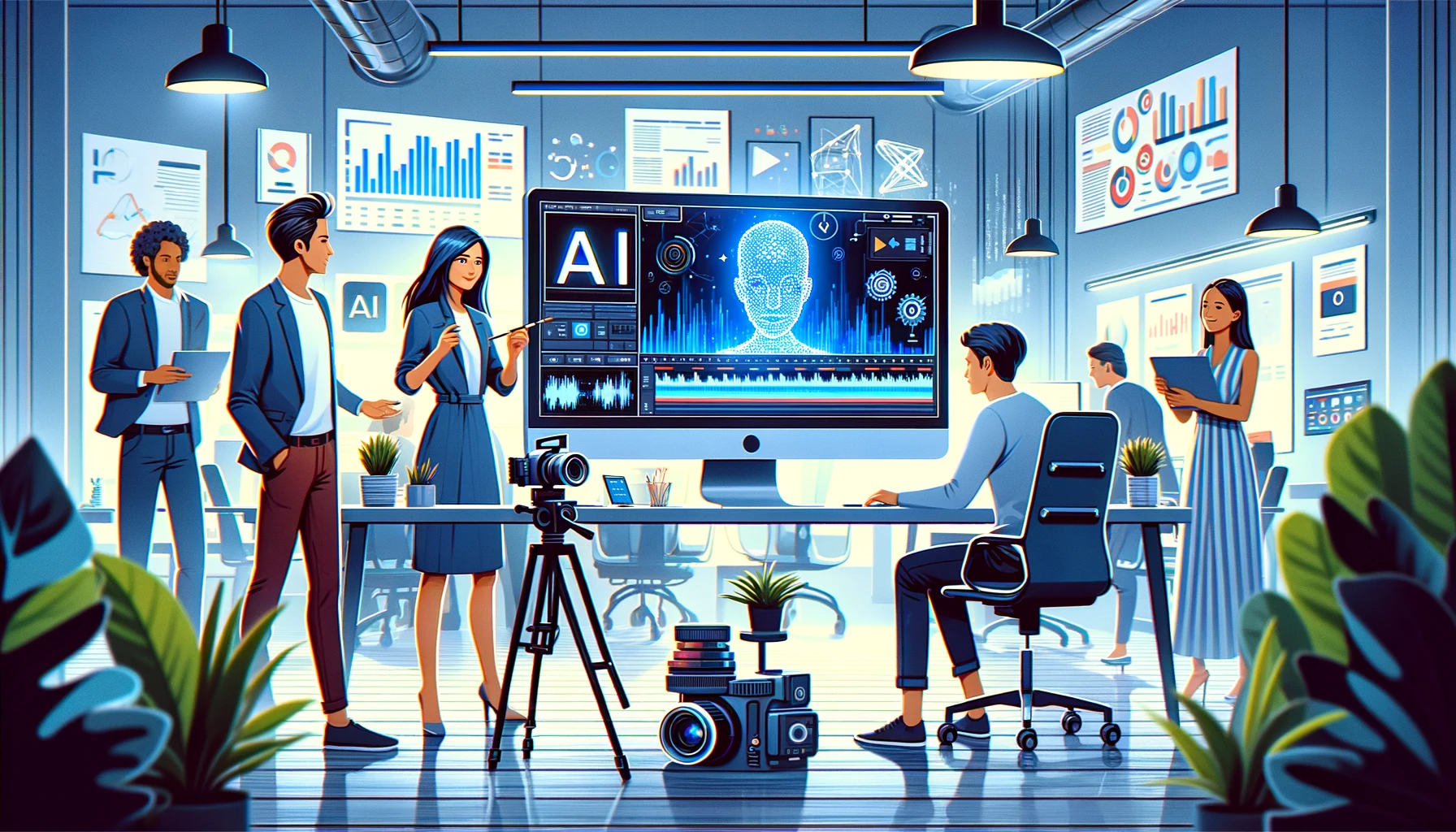Introduction
In an era where digital content reigns supreme, video AI in Video Marketing has emerged as a pivotal element in connecting brands with their audiences. This multimedia format not only captivates viewers but also drives meaningful engagement and conversion. However, the true game-changer in this domain has been the integration of Artificial Intelligence (AI). AI in video marketing is not just a futuristic concept; it’s a present-day reality transforming how we create, distribute, and consume video content.

The AI Revolution in Video Production
- Automated Editing and Production: AI technologies have streamlined video editing and production processes. Tools equipped with AI algorithms can automatically select the best footage, suggest edits, and even recommend effective transitions, significantly reducing the time and effort involved in video production.
- Speech and Text Recognition: Speech recognition and automated subtitles have opened new avenues for accessibility and global reach. AI-powered systems accurately transcribe and translate spoken words, making videos accessible to a diverse, multilingual audience. This not only broadens the viewer base but also enhances user engagement across different regions.
- Custom Graphics and Animation: AI’s capability to generate custom graphics and animations has unlocked new creative possibilities. AI algorithms can analyze a brand’s style and viewer preferences to create visually appealing and brand-consistent animations, adding a unique flair to video content.
Personalization and Targeting with AI
- Audience Analysis: AI systems excel in analyzing vast amounts of audience data, helping marketers understand viewer preferences and behaviours. This insight is crucial for creating content that resonates with the target audience, ensuring higher engagement rates.
- Content Tailoring: AI takes personalization a step further by tailoring video content for different audience segments. This could mean altering the storyline, changing the visuals, or modifying the message to suit different viewer preferences, thereby enhancing the relevance and appeal of the content.
- Dynamic Content Insertion: One of the most innovative uses of AI in video marketing is dynamic content insertion. Based on real-time viewer data, AI can insert personalized elements into videos, such as tailored product recommendations or custom messages, making each viewing experience unique and highly targeted.
AI-Driven Analytics and Performance Measurement
AI tools provide invaluable insights into video performance in real-time. Marketers can track viewer engagement, drop-off rates, and other key metrics, allowing for immediate adjustments and optimization of content strategies. Beyond analyzing current performance, AI’s predictive capabilities enable marketers to forecast future trends and video performance. This foresight aids in making data-driven decisions, optimizing content for maximum impact. The continuous learning aspect of AI creates a feedback loop for constant improvement. AI algorithms learn from each campaign’s successes and failures, refining strategies and recommendations for future video content.
Ethical Considerations and Challenges
- Data Privacy: While AI significantly enhances video marketing, it raises concerns about data privacy. Marketers must use AI responsibly, ensuring compliance with data protection regulations and respecting user privacy.
- Bias and Fairness: AI algorithms can inadvertently perpetuate biases if not carefully designed and monitored. Ensuring fairness and eliminating biases in AI models is essential to maintain ethical standards in video marketing.
- Technical Limitations: Despite its advancements, AI in video marketing still faces technical limitations. Overcoming these challenges requires ongoing research and development to fully harness AI’s potential in this field.
Navigating the Challenges: AI’s Growing Pains
Despite its numerous benefits, the journey of integrating AI into video marketing is not without its challenges. Overcoming these hurdles is essential for harnessing AI’s full potential.
As businesses scale up their video marketing efforts, maintaining the quality and consistency of AI-generated content becomes challenging. AI systems must evolve to handle increased volumes without compromising on personalization and relevance. While AI can automate many aspects of video production and analysis, the human element remains crucial. Balancing AI-driven efficiency with human creativity and emotional intelligence is key to producing content that truly resonates with viewers. As audiences become more accustomed to AI-driven content, their expectations evolve. Staying ahead of these changing preferences requires a deep understanding of both technology and consumer behavior, ensuring that video content remains engaging and relevant.
The Ethical Frontier: AI and Responsibility
As AI becomes more entrenched in video marketing, ethical considerations take centre stage. Ensuring the responsible use of AI is paramount.
- Transparency and Consent: Clear communication with audiences about the use of AI, especially in data collection and personalization, is crucial. Obtaining consent and maintaining transparency builds trust and credibility.
- Avoiding Manipulative Practices: AI’s ability to personalize content comes with the responsibility to avoid manipulative or deceptive practices. Ethical use of AI respects the viewer’s autonomy and decision-making process.
The integration of Artificial Intelligence (AI) in video marketing offers a multitude of benefits that are transforming the industry. Here are some of the key advantages:
AI enables the creation of highly personalized video content tailored to individual viewer preferences, demographics, and behaviour. This level of customization ensures more effective targeting, leading to increased viewer engagement and higher conversion rates. AI can automate various aspects of video production, such as editing, colour correction, and even scriptwriting. This automation significantly reduces the time and resources required to produce high-quality video content. AI-powered analytics tools provide in-depth insights into viewer engagement and behaviour. This data helps marketers understand what content resonates with their audience, enabling them to make more informed decisions and refine their marketing strategies. AI technologies make it easier to scale video marketing efforts without a proportional increase in effort or expense. As AI systems learn and improve, they can handle larger volumes of content production and analysis, facilitating growth. AI can generate dynamic and interactive video content, which leads to a more engaging and immersive experience for viewers. Features like AI-driven recommendations, interactive storylines, and personalized messaging keep viewers more engaged and invested in the content.
Benefits of AI in Video Marketing: Creating Compelling Content
The integration of Artificial Intelligence (AI) in video marketing offers a multitude of benefits that are transforming the industry. Here are some of the key advantages:
- Enhanced Personalization and Targeting: AI enables the creation of highly personalized video content tailored to individual viewer preferences, demographics, and behaviour. This level of customization ensures more effective targeting, leading to increased viewer engagement and higher conversion rates.
- Efficient Content Creation: AI can automate various aspects of video production, such as editing, colour correction, and even scriptwriting. This automation significantly reduces the time and resources required to produce high-quality video content.
- Improved Analytics and Insights: AI-powered analytics tools provide in-depth insights into viewer engagement and behaviour. This data helps marketers understand what content resonates with their audience, enabling them to make more informed decisions and refine their marketing strategies.
AI technologies make it easier to scale video marketing efforts without a proportional increase in effort or expense. As AI systems learn and improve, they can handle larger volumes of content production and analysis, facilitating growth. AI can generate dynamic and interactive video content, which leads to a more engaging and immersive experience for viewers. Features like AI-driven recommendations, interactive storylines, and personalized messaging keep viewers more engaged and invested in the content. By automating repetitive tasks and enhancing the efficiency of video production and analysis, AI can significantly reduce costs associated with video marketing. This cost-effectiveness is particularly beneficial for small and medium-sized businesses with limited marketing budgets.
AI tools can adapt the content in real time based on viewer interactions and feedback. This capability allows for the ongoing optimization of video marketing campaigns, ensuring they remain effective and relevant.
Conclusion
AI in video marketing is not just enhancing the way we create and distribute content; it’s redefining the very nature of audience engagement. From automated video production to personalized content and insightful analytics, AI stands at the forefront of this revolution. As marketers, embracing AI in video marketing strategies is no longer optional; it’s imperative to stay relevant in this rapidly evolving digital landscape. Let’s step into the future of marketing, where AI-driven video content is the key to captivating and engaging our audiences like never before.


Add a Comment